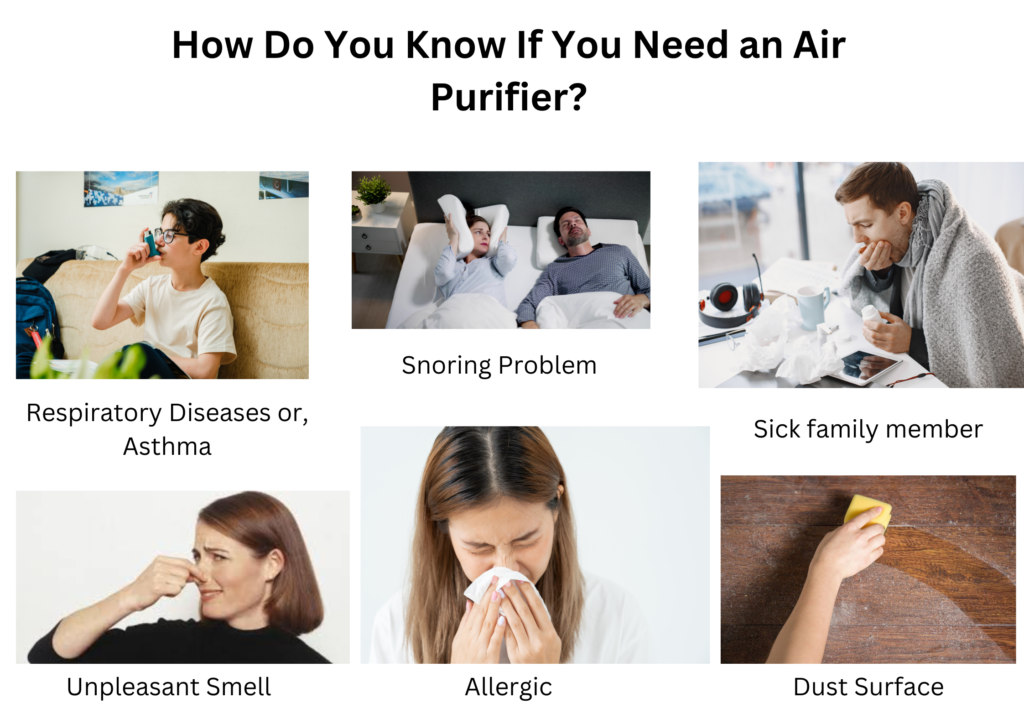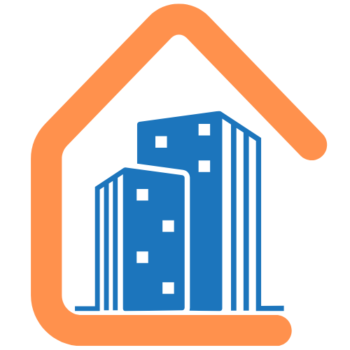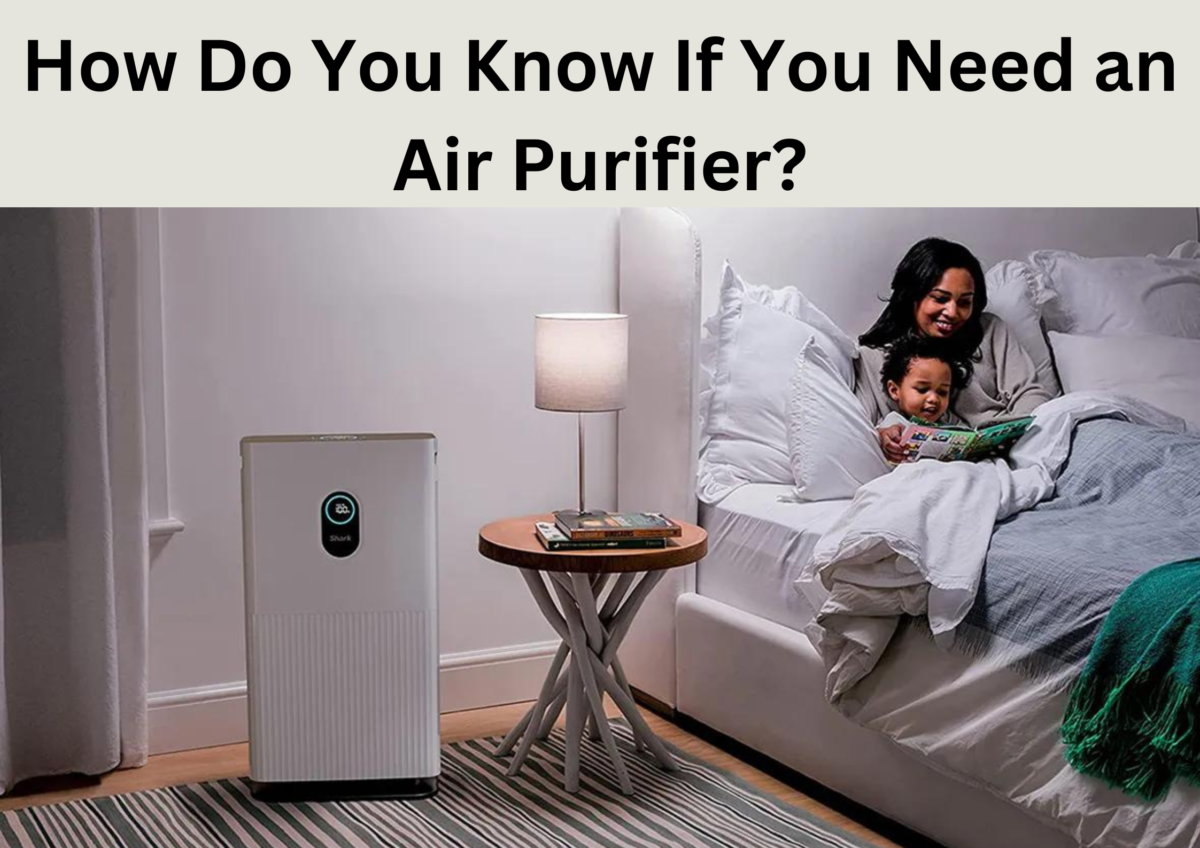According to the Environmental Protection Agency (EPA), we spend 90% of our time indoors. It also says that human exposure to indoor air pollutants is two to five times and occasionally 100 times more harmful than outdoor air pollutants. These are some scary facts describing the importance of an air purifier in your home.
An air purifier is a great device that traps the air pollutants from your indoor air and circulates fresh and clean air. It creates a healthy environment, helps with easy breathing, and also helps relieve allergic and asthma symptoms.
So, how do you know if you need an air purifier? Read the full article to learn more about the importance of good indoor air quality and the requirement of an air purifier in your home.

How Do You Know If You Need an Air Purifier?
If The Surfaces of Your Home Are Always Covered with Dust
Have you noticed dust build up on the surfaces of your home? You can find these dust particles under your bed, on the bookshelves, and on table surfaces and you find it hard to control it. These are a combination of various things like dust mites, pet dander, pollen, mold spores, soils, dead skin cells, etc.
Before settling down on surfaces the dust particles move around and float in the surrounding air. Some of these particles are very small in size that we cannot see in naked eyes and some are large and visible. While breathing these particles enter the airways and cause severe health issues. It could make you sneeze uncontrollably, you might have difficulty breathing, and you may also develop serious respiratory problems.
An air purifier traps these dust mites, pet hair, pollen, etc., and supplies purified and fresh air inside a room. By installing an air purifier you don’t have to clean as much as it removes dust particles from the air before they settle down on the surface.
If You Are Allergic
Indoor air pollutants such as pollen, dust mites, pet dander, etc. trigger allergic symptoms. These airborne allergens float around your house and enter your respiratory system while breathing. These particles could irritate your sinuses and cause sneezing. If you or, any of your family members are sneezing randomly for long periods, then it’s a clear sign that your home’s air quality is not good and you need an air purifier.
According to the National Library of Medicine, the use of air purifiers significantly reduces the need for medication requirements for patients with HDM (House Dust Mites) induced AR (Allergic Rhinitis).
The installation of a good-quality air purifier with a HEPA filter and high CADR (Clean Air Delivery Rate) reduces indoor air pollutants. It removes airborne allergens from the air and supplies clean and fresh air to breathe. Thus, it protects you from various airborne allergens, makes you feel more comfortable during the day, and also makes you sleep better at night.
If Indoor Air Has Some Unpleasant Smell
The nasty or, stuffy smell inside a house is generally because of humidity or, airborne chemicals. If the household’s product ingredients contain formaldehyde or benzene, it means you are dealing with VOCs. The smell of products having Volatile Organic Compounds (VOCs) lasts for a long time. These products are usually disinfectants, varnishes, adhesives, and products used to clean carpets.
Air purifiers with activated carbon filters can filter VOCs. So, if you are dealing with a nasty smell then make sure to buy an air purifier that can remove VOCs. Installation of a proper air purifier is necessary for a house that uses a lot of carpets. It also removes nasty odors from cooking, garbage, smoke, paints, glue, etc.
An air purifier with activated carbon filtration technology quickly filters out these nasty odors, so that they do not have a chance to linger. It circulates purified, clean, and fresh air inside your home and makes it welcoming for your guests.
If You Suffer from Any Respiratory Diseases or, Asthma
If you or, your family members suffer from respiratory diseases or, asthma, then it’s a sign that you need to install an air purifier in your home. People with respiratory diseases have sensitive airways. In asthma, the patient’s airways become inflamed, narrow, and swell which leads to difficulty in breathing.
The condition worsens for a patient when the surrounding air is polluted. In this case, keeping the indoor air pollution level down is necessary. An air purifier with an advanced filtration mechanism removes both small and large particles from the air and supplies clean and fresh air outside. Clean air makes breathing easy and will definitely help people suffering from respiratory diseases.
Snoring Loudly While Asleep
The most common reason for snoring is congested airways. Allergens like dust, pollens, pet dander, etc. cause your airways to be excessively congested. This results in snoring while asleep.
Installing an air purifier in your home removes the pollutants from the air and ensures that your airways are not blocked. If the snoring is entirely due to the pollutants in the air, then an air purifier will certainly help you with this. It helps you sleep better and reduces the frequency of snoring.
An air purifier with HEPA filtration technique is recommended to clean up large and small particles of up to 0.3 microns from the air.
If You Have a Sick Family Member
If any of your family members have been sick for a long time, then you should consider buying an air purifier. It supplies fresh and purified air inside the room. Clean air is healthy to breathe and it also offers better sleep quality. It creates a better environment to recover fast. Air purifiers with medical-grade filtration techniques are usually installed in hospitals and medical facilities.
Conclusion:
People with various respiratory diseases including asthma, and allergic symptoms need clean and fresh air to breathe. An air purifier removes both large and small particles from the air and circulates clean and fresh air inside the room. It also removes allergens from the air and relieves people suffering from allergic symptoms. It also reduces snoring and improves sleep quality. Always purchase an air purifier with proper filtration technology that meets your requirements.
FAQS
- Is it healthy to sleep with an air purifier?
Yes, it is safe and healthy to sleep with an air purifier. The airborne allergens enter the airways and block the passageways. An air purifier removes the pollutants from the air and ensures that your airways are not blocked. Thus, it creates a better environment to breathe and improves sleep quality.
2. Do air purifiers use a lot of electricity?
No, air purifiers do not consume a lot of electricity to operate. A large room air purifier consumes 0.3 to 2.4 kWh power and a large room air purifier consumes 0.24 to 0.576 kWh power. You can count on an air purifier for 24-hour air purification at home as it consumes little electricity to run.
3. Is it OK to leave the air purifier on all the time?
Yes, it is ok to leave the air purifier on all the time. You can keep it turned on all day and night. It makes you feel comfortable and fresh during the day and offers better sleep quality at night. Make sure that you are not purchasing an air purifier that releases ozone as it is very harmful to human health.
Also Read
- HEPA Air Purifier: Definition, Types, Uses, Efficiency, Working Principle
- Whole House Air Purifier: Types, Pros, Cons, Working Principle 2024
- Air Purifier Advantages and Disadvantages
- How Do Air Purifiers Help? 6 Benefits
- Whole House Dehumidifier: Types, Working Principle, Pros, Cons 2024
- How Does a Commercial Dehumidifier Work? 2024
- How Does a Dehumidifier Work? Types, Uses, Benefits 2024
- 10 Tips for Buying a Dehumidifier
- Dehumidifier Vs Air Purifier 2024
- Dehumidifier vs. Air Conditioner 2024
- Cool Mist Humidifier: Types, Uses, Benefits, Working Principle 2024
- Do Humidifiers Help with Air Quality? 2024
- When Do You Need a Humidifier? 8 Common Signs
- How Do Humidifiers Work? A Complete Guide 2024
- How Humidifier Helps Breathing? 2024
- Humidifier Vs Dehumidifier Vs Air Purifier: Which One Should You Buy? 2024


19 thoughts on “How Do You Know If You Need an Air Purifier? 2024”